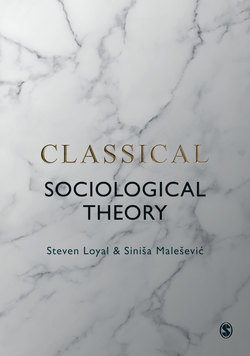Читать книгу Classical Sociological Theory - Sinisa Malesevic - Страница 20
На сайте Литреса книга снята с продажи.
Arguments and Ideas
ОглавлениеThe Republic (1945) is perhaps the book that captures best the breadth and depth of Plato’s philosophical, political and proto-sociological outlook. In his multiple dialogues, which constitute a central modality for expressing Plato’s ideas (Strauss, 1978: 52), Socrates1 argues that governing is a specialised art or craft that, like other useful crafts (medicine, shoemaking, building, navigation), requires certain skills and knowledge that has definite ends. Governing is a practice, a sense of ‘know-how’, or specialised knowledge, containing excellence and virtue or what the Greeks termed arete. Like other crafts, the art of ruling embodies specific capacities and skills and uses them to do the best work possible to serve the interest of subjects in much the same way that a shepherd tends and cares for his sheep, or a doctor heals his or her patients. Like these crafts, it is generally done for others and not for one’s own ends. Moreover, objects and individuals not only have specific functions, but also possess a peculiar excellence or virtue that enables them to work well. This applies equally to living, which is the function of the soul. Since the virtue of the soul is justice, only the just man, according to Socrates, can be happy since when the soul does not have virtue it cannot work well.
For Socrates, as for Plato, unless something is grounded in nature; it cannot serve as an objective standard and a sound basis of knowledge and action. The notion of what is ‘Good’, or right, is not a subjective interpretation as democratically inclined Sophists may argue, but rather an objective fact. In addition, Plato believed, some would argue naively, that if we know the Good we will automatically act according to its principles. The idea of the Good represents the most important of the Forms, and it is the theory of the Forms that underpins all Plato’s thinking. The Theory of Forms constitutes his attempt to deal with the relation between universals and particulars. The tangible objects we see are debased inferior copies of unseen ideas. In this sense Plato was an idealist. Similar, though by no means identical, conceptions were later used by Weber in his notion of ideal types, Hegel in his notion of the concept, and Schutz in his notion of typifications.
